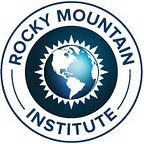Goodbye, Oil Stocks: Divesting for Impact
Mary Caulkins and husband Karl Kister are Colorado-based philanthropists who put their money where their mouth is. Longtime supporters of RMI, they were inspired by organizations like 350.org that urge colleges to divest their endowments of oil stocks as a way to bring awareness to concerns over climate change, global security, and fossil fuels. In 2013 Caulkins and Kister decided to do the same. They had their financial advisor sell their oil stocks and donate the proceeds to RMI. “While some people would consider it rash, and most financial advisors would advise against it, for us it was a new way to think about money and value,” explains Caulkins, who just completed eight years on RMI’s Board of Trustees. “The greater value to me and Karl is the exciting work that RMI is doing. We are investing in clean, smart, innovative energy systems instead of climate insecurity.”
Caulkins and Kister are also leading by example, starting a ripple effect within their own philanthropic circle. In the year-plus since Caulkins and Kister divested, many more individuals and foundations have followed suit, including the Rockefeller Foundation and two of Caulkins’s brothers who are in the process of divesting. Which is one reason Caulkins talks about her decision: “We come from a culture of privacy around money. So it’s a little bit radical to speak about this. But we put ourselves out there to encourage others not to be afraid of taking the same steps.”
Impact investing — investing in companies with the intention of generating a social or environmental impact along with a financial return — is growing, according to the Financial Times and Forbes. It also usually meets and often exceeds the performance of comparable traditional investments, according to a March 2015 report from Morgan Stanley. Think of Caulkins and Kister’s efforts as the flip side of impact investment — they’re instead practicing impact divestment. Instead of putting their money into investments they do want, they’re pulling their money out of investments they don’t want, to redeploy it in ways that reflect their values — including investing in RMI.
That approach holds powerful sway in the court of public opinion on issues. “I think if the ‘movement’ takes hold, which is our hope, then we will see positive change,” adds Caulkins. “It may not be a straight line to the oil companies but a broader signal that our society would like to change how it uses resources.” And it’s a savvy prudential move too: analysis shows that broad stock portfolios would have performed the same (or even slightly better) without their fossil-fuel stocks; their volatility adds unwanted risk; and in the longer run, clean energy will outperform them.
— Laurie Guevara-Stone
